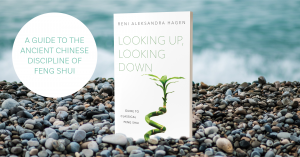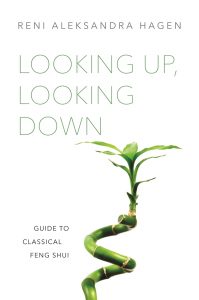 Taken from her new book, Looking Up, Looking Down, Reni Alexsandra Hagen discusses how to keep Feng Shui’s true meaning alive as it becomes increasingly commercialized in the West.
Taken from her new book, Looking Up, Looking Down, Reni Alexsandra Hagen discusses how to keep Feng Shui’s true meaning alive as it becomes increasingly commercialized in the West.
The most important reason for me taking up the serious study of feng shui was my growing frustration with all the peculiar things I encountered under the name of feng shui. After translating two feng shui books, reading a dozen others and attending various weekend courses, I had a strong feeling that there was something quite crazy about the claims being made in popular presentations. I had to make a decision: either that was the end of the whole business as far as I was concerned or I had to take up feng shui seriously. I did the latter, of course, because I sensed that there must be truth and understanding somewhere and that real feng shui was concerned with very different things to those I had been involved with so far.
There is truth in the saying that when the pupil is ready a teacher will appear. I found my teacher of authentic classical feng shui and I realised that my intuition had been right when, in spite of everything, I had decided to listen to my frustrated soul and started searching rather than slamming the door on the whole business.
When feng shui was introduced to the West, it was not as a scientific system dealing with how the forces of nature and universal life energy impact on buildings and how, in their turn, buildings shape those in them. It did not deal with an understanding of landforms and the laws of energy, or with favourable and unfavourable forms of influence, or with the wisdom passed down and refined for millennia, or with the connection between directions, cosmic influences and the effects of energy both around and within the house. It did not deal with profound insights into ‘wind and water’ and how we can benefit from the good and nourishing forces in our surroundings and avoid the negative forces. There was none of that! What was introduced instead was an instant pot-pourri in which the ingredients consisted of all kinds of exotic items from pure and simple superstition via powerful symbolism to number magic that promised to bring good luck. No wonder people were attracted. And who is to say that superstition does not sometimes have a grain of truth, that symbolism is devoid of meaning, or that magic cannot bring good luck? It was easy to take the bait.
It was easy, too, to call yourself Master, and many Western variants of feng shui were cobbled together with fancy names. There was American feng shui, and Indian-American feng shui, and Tibetan-American feng shui, but were any of them feng shui? Hocus-pocus theories even arose in Asia: ancient wisdom had become fashionable there just as it had here, and in recent times easily marketable concepts of feng shui have become widespread in the East.
Not many people realise that feng shui is actually an unfamiliar term to most Chinese people. Learning feng shui is like learning a new language, and it is a language few of the Chinese know. It’s easy to see why: the subject was strictly reserved to the powerful and kept secret for thousands of years. And then, later, the practice and use of feng shui was forbidden in China during the Cultural Revolution. Today there are no more than a few surviving classical practitioners who are true masters of the discipline and they wring their hands in despair at the distortion and commercialisation that has occurred in both the East and the West.
We all know what happens when something is marketable. Our need for security, happiness and well-being is big business. Put that together with a human tendency not to learn from our mistakes and you have a guaranteed money-spinner. We want quick solutions and we are becoming less and less critical.
Twenty-five or 30 years ago feng shui was completely unknown in the West, but some people managed to create a good business by sticking the label ‘feng shui’ on everything that had to dowith happiness and good luck, cleansing and renewal. Incense, essential oils, music, symbols, amulettes, even toilet paper were marketed as feng shui products.
I often compare the discipline of feng shui to surgery. You probably have a domestic pharmacy at home with creams, plasters, headache tablets, tinctures and herbal poultices, but you know that special expertise is required when a serious accident occurs or you suffer organ failure. That is also true of feng shui: you can tidy and clean up and make yourself comfortable with colours and symbolism and Chinese dragons and coins, but what you do not have is the insight that enables a properly trained feng shui expert to reveal how your house is affecting your life in terms of health and many other things.
If you would like to read more articles like this and hear the latest news and offers on our books, why not join our mailing list? We can send information by email or post as you prefer, and please also tell us about your areas of interest so we can send the most relevant information. You can unsubscribe at any time.
Looking Up, Looking Down
An easy-to-use guide to applying feng shui in your home to improve your energy levels, your surroundings and your world view. Explaining the underlying principles, then how to treat each room, and how to achieve balance, this excellent advice from a classically trained feng shui consultant will bring ancient Eastern wisdom into your living room.
£17.95
Read more here.
